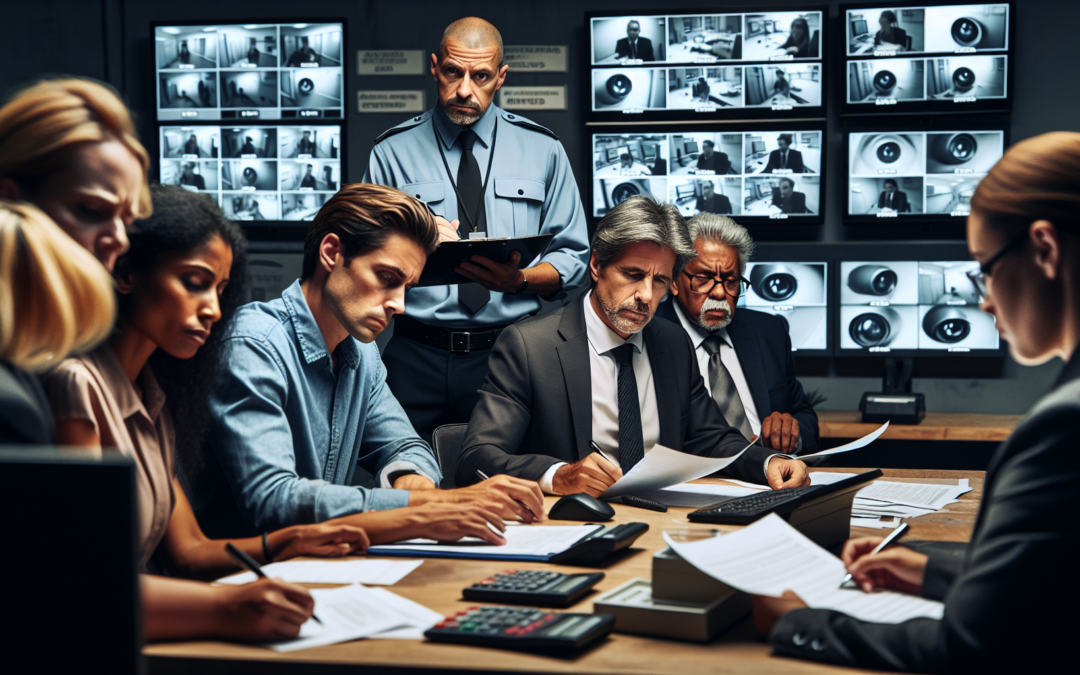Guardians Under Siege: A Deep Dive into the World of ‘Frauditors’ and Law Enforcement Response
In the kaleidoscope of our modern society, few roles are as emotionally charged and hard-pressed as that of our law enforcement officers. As they navigate bizarre interactions and high-pressure situations, they are routinely forced to confront the newly emerged phenomenon of “frauditors.” Proclaiming to champion public liberties, these self-appointed watchdogs infiltrate public spaces armed with video cameras, provoking officers into clashes that are then splashed across digital platforms.
The Anatomy of Encounters
When “frauditors” approach, police officers see their daily duties transformed into volatile interactions that blur the boundaries of civil liberties and public disturbance. The challenge here is multifaceted. On one hand, the officers need to maintain decorum and uphold the rights guaranteed by the Constitution. On the other hand, they are acutely aware of surveillance turning hostile, where every gesture may be distorted into controversy.
Many times, these random interactions are orchestrated not to resolve grievances or seek accountability but rather to bait officers into a spectacle. These confrontations, recorded and circulated online, often lack the contextual depth that viewers at home don’t have the privilege of understanding. Thus, these clips become dissected narratives, sometimes aiming to vilify officers, often ignoring the mundane reality of trying to balance protection, public tranquility, and free speech.
Defending Dignity and Duty
Law enforcement leadership works tirelessly to train officers in handling such provocative situations, focusing on de-escalation strategies while simultaneously safeguarding the public realm. Such training is crucial—it steers the path of diplomacy as officers face heightened scrutiny, keen to deconstruct their every move through lenses heavily tinted by ideology or mistrust.
Imagine a scenario: an officer steps into his shift, a routine meant to interact with citizens, solve problems, and rush to emergencies during crises. Yet the specter of falling victim to a viral headline, where fractions of unrepresentative encounters define their character and career, lurks in the back of their minds.
Day in and day out, law enforcement officers contend with such realities. Their pursuit: to emerge with justice intact, society safer, and their oath upheld amidst a swirl of skepticism.
Bracing Against Digital Manipulations
What elevates concern among law enforcement communities is how ‘frauditors’ often edit interactions to amplify alleged officers’ missteps. In greeting audiences often predisposed to distrust authority without discernment, the manipulative power of such media cannot be underestimated—it erodes trust painstakingly built over decades in their respective communities.
Concern mounts over accountability measures for those abusing public freedoms. Some, indeed, walk the dangerous line threatening foundational civic trust. Law enforcement bodies often lobby for reforms ensuring equal accountability for civilian oversights while respecting legitimate rights upheld by the Constitution. When abuse of this freedom becomes routine, society must recognize that this thin blue line is not the sole element under siege.
Building Bridges of Trust
Despite glaring provocations, most officers maintain an unwavering commitment to bridge gaps between law enforcement and civilians. From community utility programs fortified by officers to braiding roots with citizens over shared local objectives, many answers lie in good-old-fashioned empathy. Building relationships flush with trust reduces susceptibility to turn tangles into irreversible discord.
Building this trust may come as auxiliary measures – additional community outreach, participation in public dialogues, or regular engagements providing transparency over policing practices. These undertakings inspire transformation in how officers connect with the population poised to perceive them in adversarial tones.
Unity in Focus: A Call for Collective Responsibility
Faced with this dilemma between genuine police accountability and scorn stoked disingenuously, united mechanisms should and must emerge. Empowering law enforcement with the resources and contextual understanding necessary to succeed amid scrutiny is paramount.
Efforts must align such that ordinary citizens share the drive to oversee and preserve justice within the society, independent from select few “audits.” Law enforcement empowers itself best through authentic channels – breaking misconceptions, showcasing stories untold – presenting bursts of benevolence overshadowed behind provocations.
Engage with the Dialog
To explore more insights, join The John Ligato Show, especially the two-part episode delving into this topic with depth that respects every nuance—watch here. You can also stay connected via our YouTube channel and get updates on Facebook from John Ligato’s page.
In conclusion, these “frauditor” encounters are a call to elevate conversations about justice, civility, and respect within shared spaces. Acknowledging this communicates a shared responsibility, acknowledging where the breach refines into repair. Through mutual acknowledgment and dialogue informed by respect and empathy on all fronts, the landscape for our officers can indeed transform—fostering a cooperative relationship worthy not only of respect but of honor.

Recent Comments